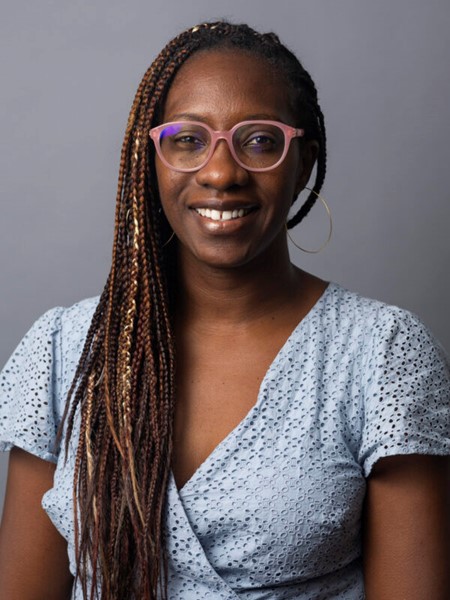 Diversifying academic health programs is still a crucial goal for higher education institutions.
Diversifying academic health programs is still a crucial goal for higher education institutions.
Idia Bintie Thurston, professor of public health & health sciences and applied psychology at Northeastern University, explores a roadmap to do so.
Idia Binitie Thurston, PhD is a licensed clinical psychologist, professor of Public Health & Health Sciences and Applied Psychology, Affiliate Professor of Africana Studies, and Associate Director of the Institute for Health Equity and Social Justice Research at Northeastern University. Her research explores how race, ethnicity, social class, gender, size, and sexuality intersect and influence health outcomes, inequities, and well-being in youth and families. She directs the CHANGE lab, where she collaborates with scholars, youth, and community organizations to develop and disseminate strengths-based, culturally-responsive tools that reduce stigma, enhance wellness, and promote resilience. She is passionate about mentoring, dismantling structural and systemic barriers, and promoting career pathways for individuals underrepresented in health sciences and psychology.
 Margarita Alegría, PhD is the Chief of the Disparities Research Unit at the Massachusetts General Hospital and The Mongan Institute, the Harry G. Lehnert, Jr. and Lucille F. Cyr Lehnert Endowed MGH Research Institute Chair and a Professor in the Departments of Medicine and Psychiatry at Harvard Medical School. Dr. Alegría has published over 300 peer-reviewed papers, and several book chapters, on topics such as improvement of health care services delivery for diverse racial and ethnic populations, conceptual and methodological issues with multicultural populations and ways to bring the community’s perspective into the design and implementation of health services. In acknowledgement of her contributions to her field, Dr. Alegría has been widely recognized and cited. Her research has been recognized by the Simon Bolivar Award by the American Psychiatry Association, the Carl Taube Award by the American Public Health Association, the Health Disparities Innovation Award from the National Institute of Minority Health and Health Disparities, the 2019 Steven Banks Award from the Mental Health Section of the American Public Health Association, the American Public Health Association’s Rema Lapouse Award (2020) and the National Latino Behavioral Health Association’s Lifetime Achievement Award for Latino Behavioral Health Research (2021). In October 2011, she was elected as a member of the National Academy of Medicine.
Margarita Alegría, PhD is the Chief of the Disparities Research Unit at the Massachusetts General Hospital and The Mongan Institute, the Harry G. Lehnert, Jr. and Lucille F. Cyr Lehnert Endowed MGH Research Institute Chair and a Professor in the Departments of Medicine and Psychiatry at Harvard Medical School. Dr. Alegría has published over 300 peer-reviewed papers, and several book chapters, on topics such as improvement of health care services delivery for diverse racial and ethnic populations, conceptual and methodological issues with multicultural populations and ways to bring the community’s perspective into the design and implementation of health services. In acknowledgement of her contributions to her field, Dr. Alegría has been widely recognized and cited. Her research has been recognized by the Simon Bolivar Award by the American Psychiatry Association, the Carl Taube Award by the American Public Health Association, the Health Disparities Innovation Award from the National Institute of Minority Health and Health Disparities, the 2019 Steven Banks Award from the Mental Health Section of the American Public Health Association, the American Public Health Association’s Rema Lapouse Award (2020) and the National Latino Behavioral Health Association’s Lifetime Achievement Award for Latino Behavioral Health Research (2021). In October 2011, she was elected as a member of the National Academy of Medicine.
A Roadmap for Diversifying the Nation’s Academic Health Programs
Since the Supreme Court’s decision to end affirmative action, institutions are facing a critical question: How can they ensure the diversity of our nation’s health professionals? The answer is simple: programs need to be as equitable and inclusive as possible. Our research offers a clear path forward – a roadmap of 13 proven strategies that universities can start using today.
We took a unique mixed-methods approach, using an online survey, in-depth qualitative interviews, and a comprehensive scoping review, to find out what really works when it comes to advancing racial and ethnic equity in the academic health sciences.
Over two-thirds of survey respondents emphasized the need for public-facing, searchable dashboards that track key metrics like enrollment, retention, and graduation rates by race and ethnicity. This approach would allow for transparent data collection and monitoring, which could serve as an accountability tool that drives real-time improvement efforts.
Particularly effective were identity-based mentoring and establishing early pathways to health science careers. These efforts have proven to be powerful tools for both attracting and retaining diverse students, faculty, and staff. Survey respondents noted that a mentor can help faculty navigate challenges and serve as a powerful example of the success that’s possible, particularly when mentors share their background.
With so many institutions still committed to racial and ethnic equity but unsure where to focus their time and resources, our research offers a way forward. Success comes from a multi-pronged investment including rethinking admissions processes, building scholar networks and providing financial support. By implementing these 13 strategies, institutions can achieve their goals of being welcoming, diverse spaces with equal opportunities for all.
Read More:
A Learning Assessment to Increase Diversity in Academic Health Sciences
Research landing page: https://www.diversityinacademia.org/
